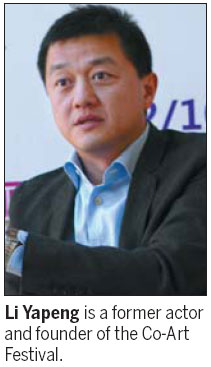Co-Art Fest delivers on its utopian promise
When I first got the invitation of Co-Art Festival, I was curious - and doubtful. The event, founded by former actor Li Yapeng, defines itself as "a utopian event for every participant".
Do people come to the festival just to get a glimpse of the star and his wife - pop diva Faye Wong?
Indeed, ever since Li married Wong in 2005 and had a daughter, Li Yan, who was born with a cleft lip, there has been a spotlight on his family life and the Smile Angel Foundation, a charity that helps other children with the condition, which the couple established in November 2006.
The 40-year-old has retired from showbiz to devote himself to developing his cultural company.
However, when I arrived at Shuhe Old Town, in Yunnan province's Lijiang, where the art festival was held from Oct 31-Nov 4, I was overwhelmed by the scenery.
The blue sky, the clear water running down from the Yulong Snow Mountain and the slow pace of local people calmed me down. For the first time, the word "utopian" resonated in my head, as I ambled down flagstone streets.

Li - a self-styled idealist - says he has been thinking about putting on such an art event since 2000, when he was producing the romantic TV series Beach, his first investment project.
"I know people doubt my ability of doing business, let alone organizing such an art festival. But I have lots of experience, which has been overshadowed by my wife," he says, laughing.
Sporting a blue suit and short neat hair, Li looks more like an entrepreneur than an actor.
Back in 1992, when he was a student at the Central Film Academy, Li and his classmate Wang Xuebing, who is also an actor, organized a rock music festival in their hometown in the Xinjiang Uygur autonomous region. In 1998, he got $500,000 from a US company to invest in two websites.
If Smile Angel Foundation is for his daughter, then the Co-Art Festival, which he started preparing for a year ago with more than 20 million yuan ($3.2 million) in investment, is a continuation of his artistic career.
Co-Art was first staged in April and will be held twice - in spring and autumn - every year.
Art events don't take place on the traditional stage, gallery or theater but, rather, are presented along the ancient streets, public areas near rivers and in courtyards.
Through music, modern dance, dramas and improvisational performances, people got close to art and were able to actually join in by talking with the performers and even performing themselves.
Li says that big-name artists are not what he wants for the festival because fame causes distance, and he hopes audiences feel equal with performers. The festival also brings local people and culture in as much as possible.
The red paper lamps hanging outside the shops, inns and restaurants have been replaced by white paper lamps, which are covered with drawings by students from Shuhe Wan Primary School.
A dozen elders of the Naxi ethnic group of Huayin village, Tai'an township, sang and danced to their oldest songs, which are facing extinction.
They told me it was the first time they were invited to perform at an art festival, and they felt proud to introduce the centuries-old music to audiences.
Lost Fear, a post-rock band, which has four young men from the Naxi ethnic group, doesn't follow rock influences from the West but, instead, makes music for Leba dance. This part of Dongba culture originated as a religious dance performed during rituals, and is closely related to Tibetan Buddhism.
International artists, such as the German band Powerhouse Swingtett, Danish percussionist Slim and Slovenian saxophonist Vasko Atanasovski, joined the local artists performing at the art festival.
Song Jie, the chief producer of the festival, previously organized the first Yulong Snow Mountain Music Festival with Cui Jian, "the godfather of Chinese rock 'n' roll", in Lijiang in 2002 and then the second in 2007. She recalls that, for the local people, such a big event felt like "air dropping".
"Lots of outsiders came to their home, playing strange, noisy music for two days," she says. "They felt it has nothing to do with them and even disliked it because of the environmental pollution and disturbance of their regular lives."
But the Co-Art Festival is not an art festival from outside. It's an art festival of Shuhe, she says.
Li jokes that his first-time investment in an art festival has received lots of attention thanks to his famous wife, who retired from the limelight in 2004 but just concluded her national tour in 2011.
The festival is free and Li hopes it would soon tour around the country.
chennan@chinadaily.com.cn






















